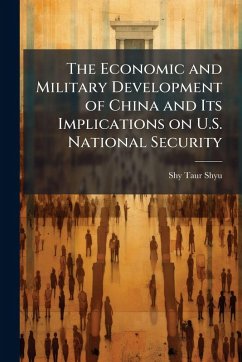
Engagement and Implications for Future National Security Strategies
Can the Services Adapt?
Versandkostenfrei!
Versandfertig in über 4 Wochen
15,99 €
inkl. MwSt.

PAYBACK Punkte
8 °P sammeln!
This monograph addresses the perplexing issue of ensuring US security strategy is coherently mated with emerging defense doctrines. America's current security strategy, "engagement," is inherently dynamic in nature. Consequently, it has surfaced four defense related issues: mission profiles beyond the design of US armed forces, debate over the role of US armed forces within an "engagement" construct, debate over the future nature of US Security Policy and doctrinal changes by the Armed forces to meet the demands generated by "engagement." This monograph investigates the challenges facing the U...
This monograph addresses the perplexing issue of ensuring US security strategy is coherently mated with emerging defense doctrines. America's current security strategy, "engagement," is inherently dynamic in nature. Consequently, it has surfaced four defense related issues: mission profiles beyond the design of US armed forces, debate over the role of US armed forces within an "engagement" construct, debate over the future nature of US Security Policy and doctrinal changes by the Armed forces to meet the demands generated by "engagement." This monograph investigates the challenges facing the US Armed Services to develop relevant doctrines adaptable to dynamic changes in national security strategies. To meet the challenges of "Engagement" the services have adopted new doctrines affecting they way they organize, train and equip: USAF, "Global Engagement;" USN, "Forward From the Sea;" and USA, "Army Vision 2010." Simultaneously, "engagement" itself has been debated with three schools of thought emerging: the "dynamic," "selective" and "disengagement" schools. Consequently, a programmatic dilemma is emerging; while the services are actively developing new doctrines to satisfy national security needs, the more cardinal issue of long-term national security policy is unsettled. The monograph assess the emerging service doctrines ability to meet the demands of possible future national security strategies by contrasting focus of each emerging service doctrine against the argument of each security strategy "school." It employs complexity theory, the historic dynamics of "great nation" foreign policy development, historic and contemporary views of US security policy and theories of international security to develop perspectives on the nature of security policy. It surveys components of US power and reviews the National Security Strategy (NSS) to evaluate the ability of the armed forces to support the NSS. Finally, it investigates the US security strategy debate and contrasts This work has been selected by scholars as being culturally important, and is part of the knowledge base of civilization as we know it. This work was reproduced from the original artifact, and remains as true to the original work as possible. Therefore, you will see the original copyright references, library stamps (as most of these works have been housed in our most important libraries around the world), and other notations in the work. This work is in the public domain in the United States of America, and possibly other nations. Within the United States, you may freely copy and distribute this work, as no entity (individual or corporate) has a copyright on the body of the work. As a reproduction of a historical artifact, this work may contain missing or blurred pages, poor pictures, errant marks, etc. Scholars believe, and we concur, that this work is important enough to be preserved, reproduced, and made generally available to the public. We appreciate your support of the preservation process, and thank you for being an important part of keeping this knowledge alive and relevant.












